【新课标】 Unit 13 We are trying to save the earth. Section A 4a-4c 共33张ppt)
文档属性
| 名称 | 【新课标】 Unit 13 We are trying to save the earth. Section A 4a-4c 共33张ppt) |
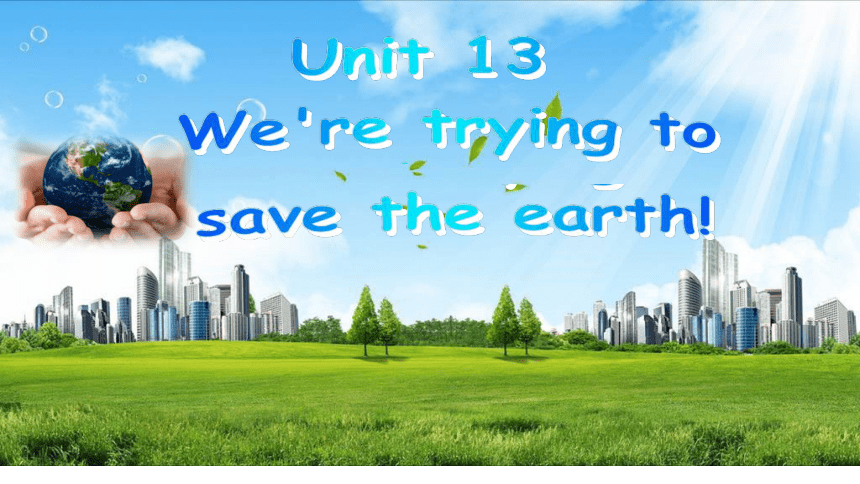
|
|
| 格式 | zip | ||
| 文件大小 | 2.3MB | ||
| 资源类型 | 试卷 | ||
| 版本资源 | 人教新目标(Go for it)版 | ||
| 科目 | 英语 | ||
| 更新时间 | 2023-02-28 10:03:49 | ||
图片预览

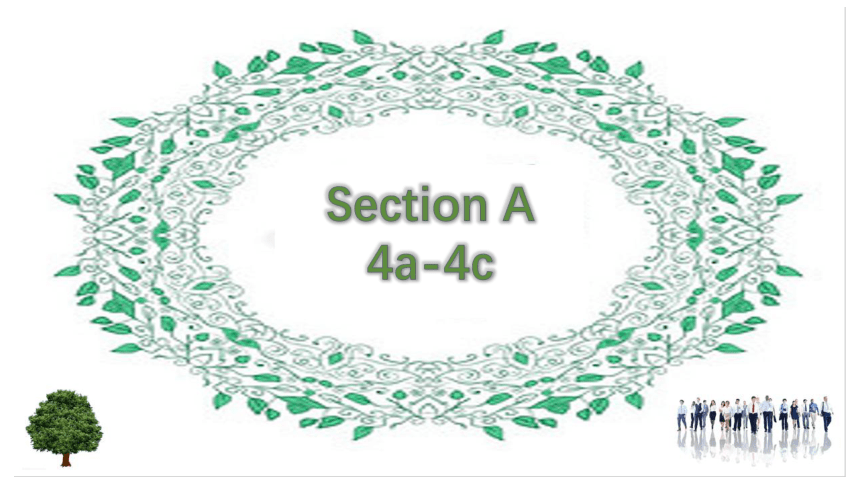
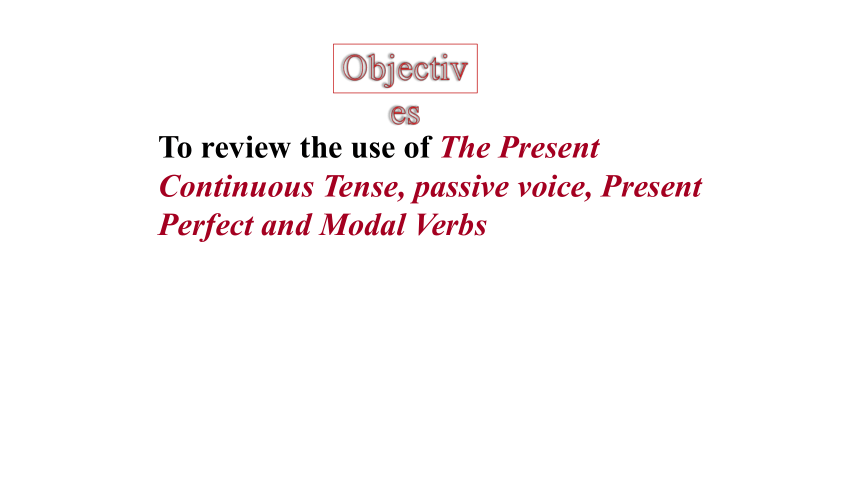
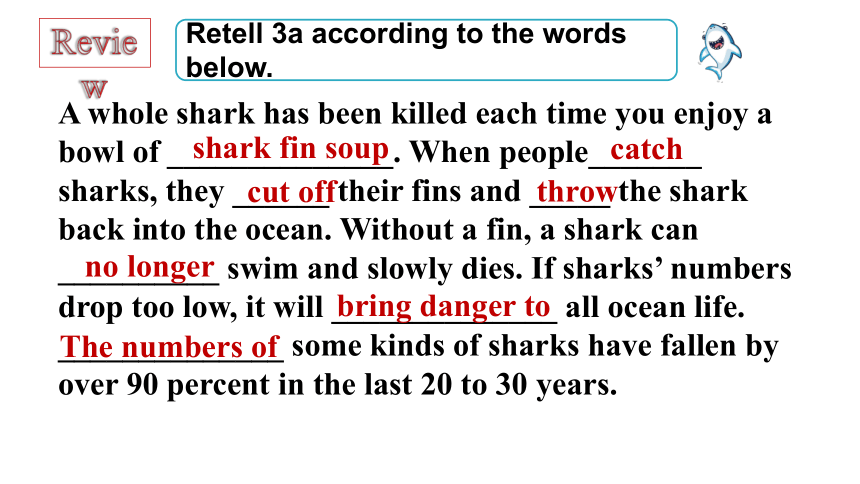
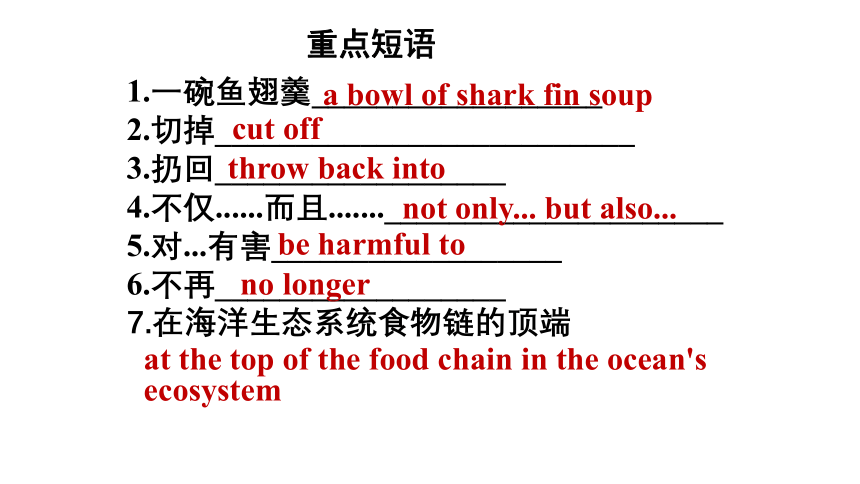
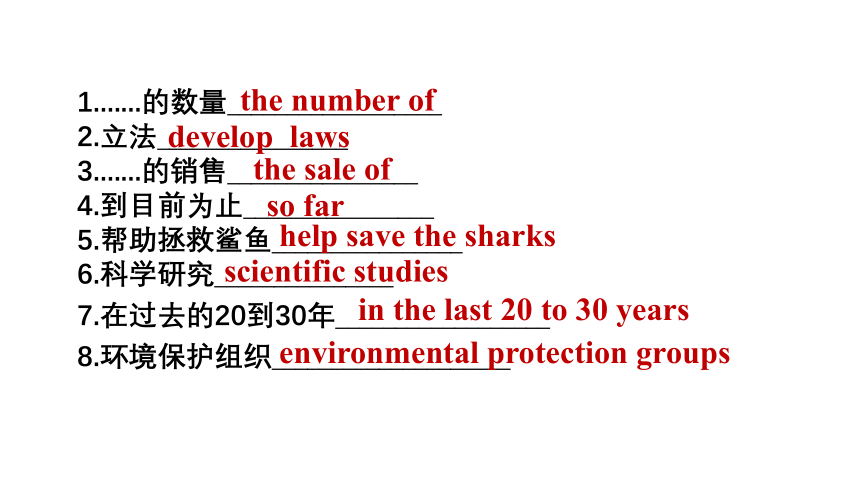
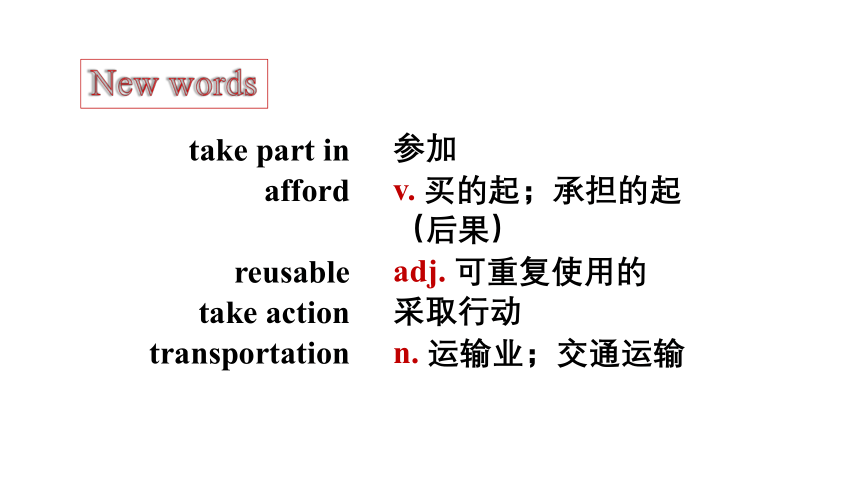

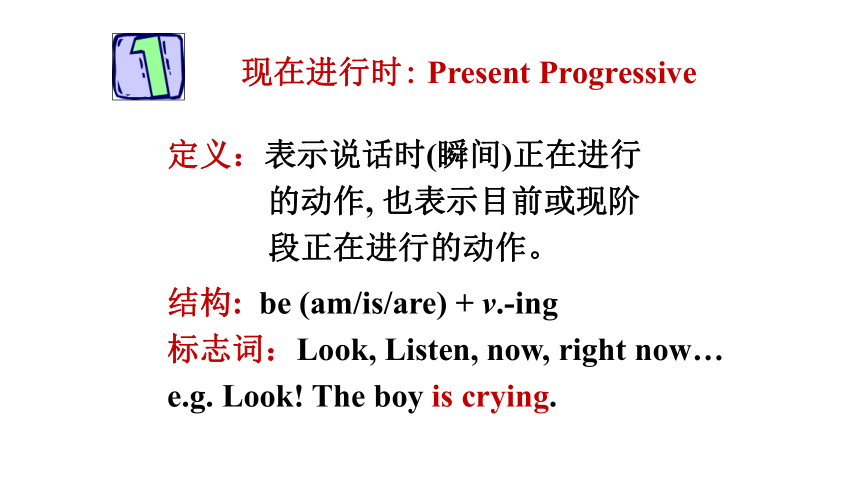
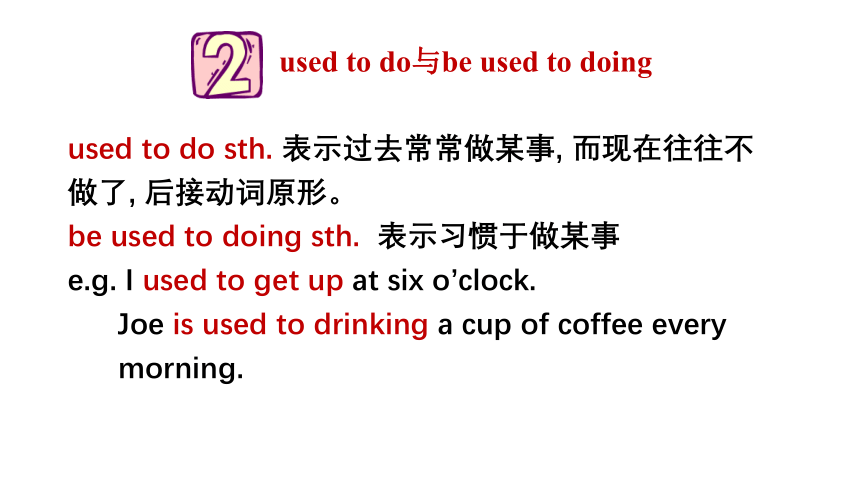
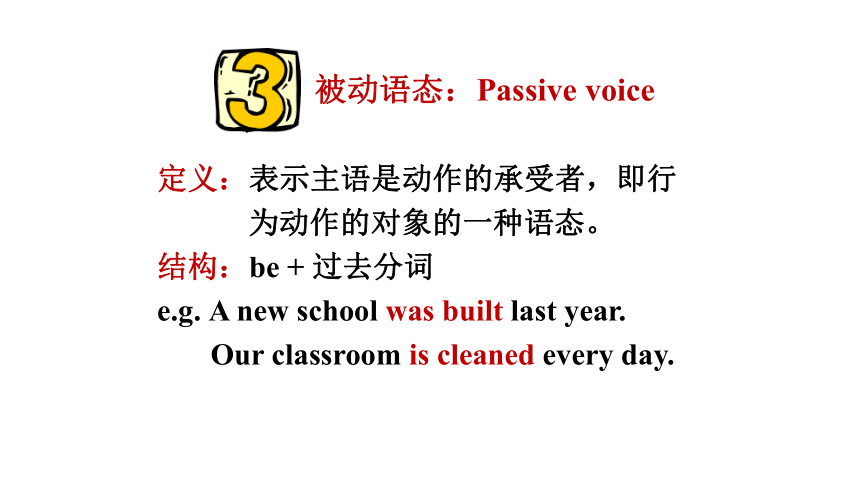
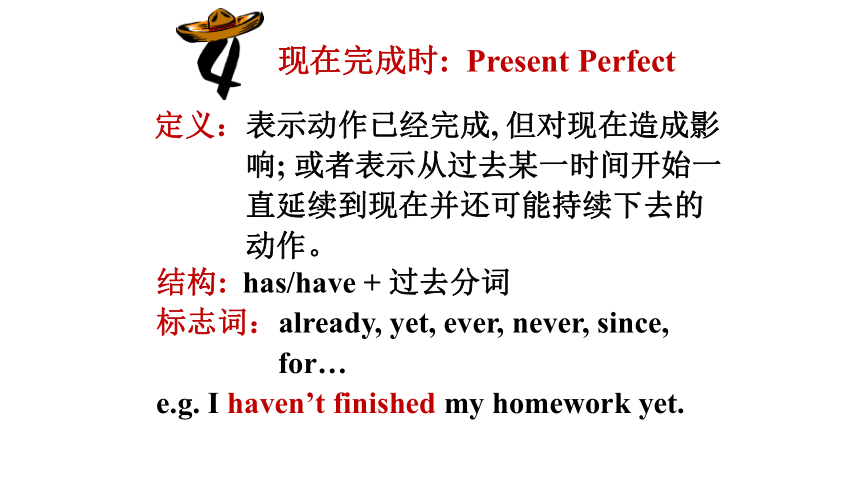
文档简介
(共33张PPT)
Section A
4a-4c
Objectives
To review the use of The Present Continuous Tense, passive voice, Present Perfect and Modal Verbs
A whole shark has been killed each time you enjoy a bowl of ______________. When people_______ sharks, they ______ their fins and _____ the shark back into the ocean. Without a fin, a shark can __________ swim and slowly dies. If sharks’ numbers drop too low, it will ______________ all ocean life. ______________ some kinds of sharks have fallen by over 90 percent in the last 20 to 30 years.
cut off
no longer
bring danger to
The numbers of
Retell 3a according to the words below.
throw
shark fin soup
catch
Review
一碗鱼翅羹__________________
切掉__________________________
扔回__________________
不仅......而且......._____________________
对...有害__________________
不再__________________
7.在海洋生态系统食物链的顶端
cut off
a bowl of shark fin soup
throw back into
not only... but also...
be harmful to
no longer
重点短语
at the top of the food chain in the ocean's ecosystem
1.......的数量__________________
2.立法________________
3.......的销售________________
4.到目前为止________________
5.帮助拯救鲨鱼________________
6.科学研究_______________
7.在过去的20到30年__________________
8.环境保护组织____________________
the number of
scientific studies
help save the sharks
so far
the sale of
develop laws
in the last 20 to 30 years
environmental protection groups
take part in
afford
reusable
take action
transportation
参加
v. 买的起;承担的起(后果)
adj. 可重复使用的
采取行动
n. 运输业;交通运输
New words
1. We're trying to save the earth.
2. No scientific studies have shown that shark fins are good for health.
3. The air is badly polluted.
4.The river used to be so clean.
5. We should help save the sharks.
现在进行时
used to
被动语态
现在完成时
情态动词
Grammar Focus
现在进行时: Present Progressive
结构: be (am/is/are) + v.-ing
标志词:Look, Listen, now, right now…
e.g. Look! The boy is crying.
定义:表示说话时(瞬间)正在进行的动作, 也表示目前或现阶段正在进行的动作。
used to do sth. 表示过去常常做某事, 而现在往往不
做了, 后接动词原形。
be used to doing sth. 表示习惯于做某事
e.g. I used to get up at six o’clock.
Joe is used to drinking a cup of coffee every morning.
used to do与be used to doing
被动语态:Passive voice
定义:表示主语是动作的承受者,即行
为动作的对象的一种语态。
结构:be + 过去分词
e.g. A new school was built last year.
Our classroom is cleaned every day.
结构: has/have + 过去分词
标志词:already, yet, ever, never, since,
for…
e.g. I haven’t finished my homework yet.
定义:表示动作已经完成, 但对现在造成影
响; 或者表示从过去某一时间开始一
直延续到现在并还可能持续下去的
动作。
现在完成时: Present Perfect
1. 情态动词本身有一定的词义, 表示说话人的情绪、态度或语气, 但不能单独作谓语, 只能与其他动词构成谓语。常见的有: can (could), may (might), must, need, shall (should), will (would)等。
情态动词
2. 情态动词无人称和数的变化, 后接动词原形。否定式是在情态动词后面加not。个别情态动词有过去式形式, 可用来表达更加客气、委婉的语气。
e.g. Ken can climb up the tress like a
koala.
Tracy could ride a bicycle when
she was five years old.
You mustn’t play with fire. It is
dangerous.
3. 考查表示“推测”的情态动词。
1) — I saw Lily in the supermarket this
morning.
— Oh, it ________ her. She moved to
Australia the day before yesterday.
A. can be B. must be
C. can’t be D. mustn’t be
2) After a long walk, the children ________
be very tired now.
A. will B. must
C. have to D. can
3) John ________ go with us tomorrow, but
he isn’t sure.
A. must B. can
C. need D. may
【考点点拨】
★may, can, must都可表“推测”,三者
的可能性依次递增。
★may和must表“推测”常用于肯定句中,can表“推测”常用于否定句和疑问句中。
4.考查need, must和have to的用法。
1) Jim, you ________ play with the knife.
You ________ hurt yourself.
A. won’t; can’t B. mustn’t; may
C. shouldn’t; must D. can’t; shouldn’t
2) — ________ I have to hand in my
homework now, Mr Zhang
— Yes, you do.
A. Do B. Can
C. May D. Must
Fill in the blanks with the correct forms of the verbs in brackets.
Joe: _____ you ever ______ (take) part in
an environmental project
Eric: Yes, I have. I ______ (help) with a
Clean-Up Day last year. It was
__________ (consider) the biggest
clean-up project this city ____ ever
____ (have).
Have
taken
helped
considered
had
had
参加
4a
Joe: How many people ____ (take) part
Eric: I _____ (think) more than 1,000
people ______ (come) to help out.
Joe: That’s fantastic! I guess everyone in
this city is ______ (try) to improve
the environment.
Eric: Yes, we can’t afford to ____ (wait)
any longer to take action!
took
think
came
trying
wait
v. 承担得起(后果); 买得起
Fill in the blanks with the appropriate
modal verbs from the box.
People __________ think that big things
______ be done to save the earth. Many
forget that saving the earth begins with
small things. For example, you ____ save
may/might
must
can
can would could have to should must may/ might
4b
electricity by turning off the lights when
you leave a room. You ______ also use
reusable bags instead of plastic bags. I think it’s a great idea that you now ______ pay for plastic bags in some stores. And instead of driving to school or work, you __________ ride your bike or walk. If it’s far, you __________ take the bus. All these
could
have to
can/should
can/could
small things ______ add up and become big things that ___________ improve the environment. Let’s take action now!
could
would/can
Make a list of things that people can do to help the environment and discuss your list with your partner.
use public transportation (n.交通运输);
turn off the lights when you leave a room;
use reusable bags instead of plastic bags;
ride your bike or walk to school or work;
stop using paper napkins(餐巾纸);
recycle books and paper
…
4c
I think that everyone should use public transportation.
I disagree. It’s difficult for parents with young children to use public transportation…
Discussion
1. We can’t afford to wait any longer to take action!
afford v. 承担得起; 提供, 给予
afford to do sth. (常与can, be able to连用) 买得起; 有足够的……
e.g. We can’t afford to pay such a price.
我们付不起这个价钱。
Dancing affords us pleasure.
跳舞给我们带来快乐。
Language points
2. …save electricity by turning off the lights when you leave a room.
turn off 关掉
e.g. Please turn the television off before you go to bed.
睡觉前请关掉电视。
turn around 转身
turn up 调高(音量)
turn down 调低; 拒绝
turn into 变成; 进入
turn on 打开, 发动
turn off 关掉, 关闭
turn out to be 结果是
turn over 移交
拓展: turn相关短语
用括号内所给动词的正确形式填空。
1. The girls ___________(dance) in the classroom now.
2. It’s 5 o’clock. Mike _________ (have) dinner.
3. —_______ you ever _____ (be) to the US
—Yes, twice.
4. —May I speak to John
—Sorry, he _________ (go) to New York. He will be back in two years.
are dancing
Have been
is having
has gone
Exercises
5. I __________ (live) here since 1999.
6. — Do you often clean your classroom
— Yes. Our classroom _________ (clean) every day.
7. — Did you go to Jack’s birthday party
— No, I ______________ (not invite).
8. — It’s a CD. This CD _______ (use) for learning English.
9. A new highway in my hometown ___________ (build) next month.
have lived
is cleaned
wasn’t invited
is used
will be built
1. 你曾经点过鱼翅汤吗?
Have you ever ordered shark fin soup
2. 我们应该在山上种更多的树。
We should plant more trees on the hills.
3. 我们学校对面过去是田地。
There used to be fields across from our school.
4. 这条河被周围的工厂严重污染了。
The river is badly polluted by the factories around here.
5. 当地政府正在尽力解决这个问题。
The local government is trying to solve this problem.
翻译句子。
Summary
be (am/is/are) + v.-ing
used to do与be used to doing
be + 过去分词
has/have + 过去分词
情态动词: can, may, must…
Homework
1. Review present progressive, passive voice, present perfect, used to and modal verbs.
2. Finish the exercises in the books.
3. Preview the new words and expressions.
4. Preview 1a-2a in Section B.
Section A
4a-4c
Objectives
To review the use of The Present Continuous Tense, passive voice, Present Perfect and Modal Verbs
A whole shark has been killed each time you enjoy a bowl of ______________. When people_______ sharks, they ______ their fins and _____ the shark back into the ocean. Without a fin, a shark can __________ swim and slowly dies. If sharks’ numbers drop too low, it will ______________ all ocean life. ______________ some kinds of sharks have fallen by over 90 percent in the last 20 to 30 years.
cut off
no longer
bring danger to
The numbers of
Retell 3a according to the words below.
throw
shark fin soup
catch
Review
一碗鱼翅羹__________________
切掉__________________________
扔回__________________
不仅......而且......._____________________
对...有害__________________
不再__________________
7.在海洋生态系统食物链的顶端
cut off
a bowl of shark fin soup
throw back into
not only... but also...
be harmful to
no longer
重点短语
at the top of the food chain in the ocean's ecosystem
1.......的数量__________________
2.立法________________
3.......的销售________________
4.到目前为止________________
5.帮助拯救鲨鱼________________
6.科学研究_______________
7.在过去的20到30年__________________
8.环境保护组织____________________
the number of
scientific studies
help save the sharks
so far
the sale of
develop laws
in the last 20 to 30 years
environmental protection groups
take part in
afford
reusable
take action
transportation
参加
v. 买的起;承担的起(后果)
adj. 可重复使用的
采取行动
n. 运输业;交通运输
New words
1. We're trying to save the earth.
2. No scientific studies have shown that shark fins are good for health.
3. The air is badly polluted.
4.The river used to be so clean.
5. We should help save the sharks.
现在进行时
used to
被动语态
现在完成时
情态动词
Grammar Focus
现在进行时: Present Progressive
结构: be (am/is/are) + v.-ing
标志词:Look, Listen, now, right now…
e.g. Look! The boy is crying.
定义:表示说话时(瞬间)正在进行的动作, 也表示目前或现阶段正在进行的动作。
used to do sth. 表示过去常常做某事, 而现在往往不
做了, 后接动词原形。
be used to doing sth. 表示习惯于做某事
e.g. I used to get up at six o’clock.
Joe is used to drinking a cup of coffee every morning.
used to do与be used to doing
被动语态:Passive voice
定义:表示主语是动作的承受者,即行
为动作的对象的一种语态。
结构:be + 过去分词
e.g. A new school was built last year.
Our classroom is cleaned every day.
结构: has/have + 过去分词
标志词:already, yet, ever, never, since,
for…
e.g. I haven’t finished my homework yet.
定义:表示动作已经完成, 但对现在造成影
响; 或者表示从过去某一时间开始一
直延续到现在并还可能持续下去的
动作。
现在完成时: Present Perfect
1. 情态动词本身有一定的词义, 表示说话人的情绪、态度或语气, 但不能单独作谓语, 只能与其他动词构成谓语。常见的有: can (could), may (might), must, need, shall (should), will (would)等。
情态动词
2. 情态动词无人称和数的变化, 后接动词原形。否定式是在情态动词后面加not。个别情态动词有过去式形式, 可用来表达更加客气、委婉的语气。
e.g. Ken can climb up the tress like a
koala.
Tracy could ride a bicycle when
she was five years old.
You mustn’t play with fire. It is
dangerous.
3. 考查表示“推测”的情态动词。
1) — I saw Lily in the supermarket this
morning.
— Oh, it ________ her. She moved to
Australia the day before yesterday.
A. can be B. must be
C. can’t be D. mustn’t be
2) After a long walk, the children ________
be very tired now.
A. will B. must
C. have to D. can
3) John ________ go with us tomorrow, but
he isn’t sure.
A. must B. can
C. need D. may
【考点点拨】
★may, can, must都可表“推测”,三者
的可能性依次递增。
★may和must表“推测”常用于肯定句中,can表“推测”常用于否定句和疑问句中。
4.考查need, must和have to的用法。
1) Jim, you ________ play with the knife.
You ________ hurt yourself.
A. won’t; can’t B. mustn’t; may
C. shouldn’t; must D. can’t; shouldn’t
2) — ________ I have to hand in my
homework now, Mr Zhang
— Yes, you do.
A. Do B. Can
C. May D. Must
Fill in the blanks with the correct forms of the verbs in brackets.
Joe: _____ you ever ______ (take) part in
an environmental project
Eric: Yes, I have. I ______ (help) with a
Clean-Up Day last year. It was
__________ (consider) the biggest
clean-up project this city ____ ever
____ (have).
Have
taken
helped
considered
had
had
参加
4a
Joe: How many people ____ (take) part
Eric: I _____ (think) more than 1,000
people ______ (come) to help out.
Joe: That’s fantastic! I guess everyone in
this city is ______ (try) to improve
the environment.
Eric: Yes, we can’t afford to ____ (wait)
any longer to take action!
took
think
came
trying
wait
v. 承担得起(后果); 买得起
Fill in the blanks with the appropriate
modal verbs from the box.
People __________ think that big things
______ be done to save the earth. Many
forget that saving the earth begins with
small things. For example, you ____ save
may/might
must
can
can would could have to should must may/ might
4b
electricity by turning off the lights when
you leave a room. You ______ also use
reusable bags instead of plastic bags. I think it’s a great idea that you now ______ pay for plastic bags in some stores. And instead of driving to school or work, you __________ ride your bike or walk. If it’s far, you __________ take the bus. All these
could
have to
can/should
can/could
small things ______ add up and become big things that ___________ improve the environment. Let’s take action now!
could
would/can
Make a list of things that people can do to help the environment and discuss your list with your partner.
use public transportation (n.交通运输);
turn off the lights when you leave a room;
use reusable bags instead of plastic bags;
ride your bike or walk to school or work;
stop using paper napkins(餐巾纸);
recycle books and paper
…
4c
I think that everyone should use public transportation.
I disagree. It’s difficult for parents with young children to use public transportation…
Discussion
1. We can’t afford to wait any longer to take action!
afford v. 承担得起; 提供, 给予
afford to do sth. (常与can, be able to连用) 买得起; 有足够的……
e.g. We can’t afford to pay such a price.
我们付不起这个价钱。
Dancing affords us pleasure.
跳舞给我们带来快乐。
Language points
2. …save electricity by turning off the lights when you leave a room.
turn off 关掉
e.g. Please turn the television off before you go to bed.
睡觉前请关掉电视。
turn around 转身
turn up 调高(音量)
turn down 调低; 拒绝
turn into 变成; 进入
turn on 打开, 发动
turn off 关掉, 关闭
turn out to be 结果是
turn over 移交
拓展: turn相关短语
用括号内所给动词的正确形式填空。
1. The girls ___________(dance) in the classroom now.
2. It’s 5 o’clock. Mike _________ (have) dinner.
3. —_______ you ever _____ (be) to the US
—Yes, twice.
4. —May I speak to John
—Sorry, he _________ (go) to New York. He will be back in two years.
are dancing
Have been
is having
has gone
Exercises
5. I __________ (live) here since 1999.
6. — Do you often clean your classroom
— Yes. Our classroom _________ (clean) every day.
7. — Did you go to Jack’s birthday party
— No, I ______________ (not invite).
8. — It’s a CD. This CD _______ (use) for learning English.
9. A new highway in my hometown ___________ (build) next month.
have lived
is cleaned
wasn’t invited
is used
will be built
1. 你曾经点过鱼翅汤吗?
Have you ever ordered shark fin soup
2. 我们应该在山上种更多的树。
We should plant more trees on the hills.
3. 我们学校对面过去是田地。
There used to be fields across from our school.
4. 这条河被周围的工厂严重污染了。
The river is badly polluted by the factories around here.
5. 当地政府正在尽力解决这个问题。
The local government is trying to solve this problem.
翻译句子。
Summary
be (am/is/are) + v.-ing
used to do与be used to doing
be + 过去分词
has/have + 过去分词
情态动词: can, may, must…
Homework
1. Review present progressive, passive voice, present perfect, used to and modal verbs.
2. Finish the exercises in the books.
3. Preview the new words and expressions.
4. Preview 1a-2a in Section B.
同课章节目录
- Unit 1 How can we become good learners.
- Section A
- Section B
- Unit 2 I think that mooncakes are delicious!
- Section A
- Section B
- Unit 3 Could you please tell me where the restroom
- Section A
- Section B
- Unit 4 I used to be afraid of the dark.
- Section A
- Section B
- Unit 5 What are the shirts made of?
- Section A
- Section B
- Review of Units 1-5
- Unit 6 When was it invented?
- Section A
- Section B
- Unit 7 Teenagers should be allowed to choose their
- Section A
- Section B
- Unit 8 It must belong to Carla.
- Section A
- Section B
- Unit 9 I like music that I can dance to.
- Section A
- Section B
- Unit 10 You're supposed to shake hands.
- Section A
- Section B
- Review of Units 6-10
- Unit 11 Sad movies make me cry.
- Section A
- Section B
- Unit 12 Life is full of the unexpected
- Section A
- Section B
- Unit 13 We're trying to save the earth!
- Section A
- Section B
- Unit 14 I remember meeting all of you in Grade 7.
- Section A
- Section B
- Review of Units 11-14
